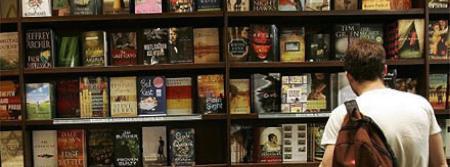2010 brought the heat, but as the year closed off, I felt like I had met its every challenge. It’s weird to see people on Facebook thanking 2010– I mean, I guess for some people the year included marriages and babies. Less so for me, but if I were the type to thank years on the internet, I would say I’m glad I went through 2010. I’m stronger, as a writer, person, runner and reader, for it.
But whatever happens in each year, I always read a lot of books, and here’s the list of what I read in 2010:
Hateship, Friendship, Courtship, Loveship, Marriage: Stories, Alice Munro
The Myth of Sisyphus, Albert Camus*®
Sometimes you just have to read a story about a man condemned to push a rock up a mountain every day to get inspired.
Two Lives, Janet Malcolm
Pnin, Vladimir Nabokov
The Wind-Up Bird Chronicle, Haruki Murakami*®
The first time I read this book, I was 18 and in Switzerland. The stuff about the well and the skinning in the Mongolian desert had stayed with me for the past nine years, and I wanted to reread it to remind myself how influential the book has been to my understanding of many topics.
What I Talk About When I Talk About Running, Haruki Murakami*®
Even though I didn’t love this book the first time I read it, I have a feeling I’ll be rereading it every six months for the rest of my life. This slim book always reminds me that running, writing and life are meant to be hard, and the only way to deal with that fact is to work hard.
Stitches, David Small
Both Ways Is The Only Way I Want It, Maile Meloy®
Everyone read this book. Maile Meloy is able to write short stories around a feeling—loneliness, unrealized desires, mostly—instead of around some stupid narrative. She’s really great, and I’m sure her next book is going to be a Big Deal, so read this now so you can talk about how you knew all along.
A Farewell To Arms, Ernest Hemingway
Falconer, John Cheever
Cheever, Blake Bailey
Remember that time a college acquaintance, his girlfriend and I wanted to start a book club, decided to read an 800 page biography of a writer no one really reads anymore, and then I read the book and they never emailed me back about setting up a meeting?
Game Change, John Heilemann and Mark Halperin
Half in Love, Maile Meloy ®
Read Maile Meloy. Especially “Garrison Junction."
Native Speaker, Chang-Rae Lee
Men Without Women, Ernest Hemingway ®
The White Album, Joan Didion ®
The first thing I read my Joan Didion was The Year of Magical Thinking, which was not the place to start. This collection of essays is. I wish I had more adjectives around, but mostly, wow.
A Gate At the Stairs, Lorrie Moore
American Psycho, Bret Easton Ellis
American Pastoral, Philip Roth*®
If I could write about anything the way he writes about gloves, I’d be a much more accomplished author.
Salvador, Joan Didion®
Self-Help, Lorrie Moore
What I Talk About When I Talk About Running, Haruki Murakami*®
See above.
Seize The Day, Saul Bellow
My favorite thing about this book is still that there’s a dog named Scissors.
Elliot Allagash, Simon Rich
Mr. Peanut, Adam Ross
Reading Myself and Others, Philip Roth
The Big Short, Michael Lewis
I don’t think Michael Lewis could make short selling easier to understand, and yet, I still don’t understand it.
The Book of Common Prayer, Joan Didion
Cadillac Desert, Marc Reisner
Long story short: don’t move to L.A. It’s an unsustainable city.
Good Bones, Margaret Atwood
Blind Willow, Sleeping Women, Haruki Murakami®
Natasha, David Bezmozgis
I wasn’t crazy about this collection of interconnected stories, but I did love Bezmozgis’s piece in the 20 under 40 issue of the New Yorker.
Lowboy, John Wary
Freedom, Jonathan Franzen®
Earlier.
Everything Ravaged, Everything Burned, Wells Tower
Where I’m Calling From, Raymond Carver
Changing My Mind, Zadie Smith ®
I go to readings fairly often, and they’re generally boring. After all, it’s just words on paper, said aloud. But I heard Zadie Smith read from this collection of essays at NYU, and was totally moved. Especially by her essay, ”That Crafty Feeling.“ I bought the book soon after.
Anything You Say Can and Will Be Used Against You, Laurie Lynn Drummond ®
Truman Capote Stories, Truman Capote
The Sun Also Rises, Ernest Hemingway*®
This book is even more depressing on the second go, because you’re not impressed by the initial glamour of Jake’s ex-pat lifestyle, you just see how empty his existence is right away.
Disgrace, J.M. Coetzee
Apparently, I can only handle jerk male protagonists if they’re Jewish.
Empire Falls, Richard Russo
Sexy, Joyce Carol Oats
La Place de la Concorde Suisse, John McPhee
Previously read: 2009, 2008, 2007, 2006




 February is a weird time. It’s been winter for long enough that snow and long johns have lost their novelty, but it’s not close enough to the end of the season for spring to peak through for a few days. And even though it gets dark earlier in December, it feels like winter is closing in around you all the time.
February is a weird time. It’s been winter for long enough that snow and long johns have lost their novelty, but it’s not close enough to the end of the season for spring to peak through for a few days. And even though it gets dark earlier in December, it feels like winter is closing in around you all the time. 


